“We share a commitment to commemorate the victims of the Holocaust and to honour those who stood against it.”
-- Declaration of the Stockholm International Forum on the Holocaust
 INTERNATIONAL HOLOCAUST REMEMBRANCE ALLIANCE
INTERNATIONAL HOLOCAUST REMEMBRANCE ALLIANCE
“We share a commitment to commemorate the victims of the Holocaust and to honour those who stood against it.”
-- Declaration of the Stockholm International Forum on the Holocaust
3 February 2014
In late January I attended the IHRA symposium on “Killing Sites” in Krakow, Poland. Recognizing the importance of ensuring that the millions killed at these sites are remembered was the primary reason why IHRA identified killing sites as a priority in its Multi-Year Work Plan. The conference was well organized and demonstrated the importance of urging political leaders to support such undertakings. I would like to thank the members of the Steering Committee on Killing Sites for their hard work in bringing this important conference to fruition.
Next I went to Helsinki to meet with members of the Finish Ministry of Foreign Affairs and the Ministry of Education to emphasize the importance of having Member States attend IHRA Plenary meetings. The discussions were productive and I also had an opportunity to discuss the Finnish education system with members of its National Board of Eduation.
I attended the International Day of Commemoration in Memory of the Victims of the Holocaust on the January 27 at the United Nations in Vienna. The event was a collaborate effort of IHRA, Yad Vashem, the London Jewish Cultural Centre, the United Kingdom, the European Shoah Legacy Institute, the Czech Republic, the Canadian IHRA Chairmanship, and the Holocaust and United Nations Outreach Programme. All three winners of the international poster competition were in attendance and it was wonderful to see that the top two were Canadian.
On the January 28, I was in Geneva to participate with the UN High Commissioner for Human Rights at a side event on Holocaust remembrance. That evening, I also spoke at a very moving event with survivors at the Assembly Hall, Palais des Nations. The event was well attended by civil society and diplomats.
During my visit in Geneva, I also had an opportunity to meet with the Deputy Minister of Justice, Ms. Monika Balatoni, regarding the Hungarian Chairmanship of IHRA in 2015. I appreciated her interest in consulting with me regarding their upcoming Chairmanship.
My next journey took me to Rome and the Holy See where I met with His Eminence Cardinal Stafford and His Eminence Cardinal Ouellett regarding the need for cooperation between IHRA and the Vatican. Both meetings were productive.
On January 31, I met with the Chief Rabbi of Rome, Dr. Riccardo Di Segni. We had a very positive exchange and I learned a great deal about Jewish life in Rome. Following this meeting our delegation – which consisted of Sir Andrew, Professor Katz, Kathrin, and both the UK and Canadian Ambassadors – met with Msgr. Brian Farrell, Vice President of the Pontifical Commission of the Holy See for Religious Relations with the Jews; Msgr. Camilleri, the Undersecretary for Relations with States at the Secretariat of State; Msgr. Peter Wells, Assessor to the Secretary of State; and Msgr. Jose Bettencourt, Chief of Protocol. These meetings went extremely well, with a great amount of time given to discussion on a host of issues. This was a wonderful opportunity to share IHRA’s priorities with the Holy See and discuss how best deepen cooperation with the Vatican. I really feel strongly that dialogue with the Holy See needs to go beyond the archives issue. IHRA and the Vatican share common interests in commemorating and memorializing the victims of the Holocaust and in the field of Holocaust education. I wish to thank Canadian Ambassador Jon Allen and his staff for the wonderful program that they organized for us during our visit.
16 January 2014
I would like to take this opportunity to wish everyone a happy New Year. I was in Washington in mid-January to attend the Association of Holocaust Organizations’ (AHO) Winter Seminar at the United States Holocaust Memorial Museum. AHO was created in 1985 to advance Holocaust education, remembrance and research. I am grateful to Dr. William L. Shulman for inviting me to speak at the event. Bill, as we know him best in IHRA, has been president of the AHO for the last twenty-five years and was one of the original founders of the AHO.
While in Washington, I had an opportunity to speak with Ira Forman, US Special Envoy to Monitor and Combat Antisemitism. Ira heads the Office to Monitor and Combat Antisemitism, which is a part of the Bureau of Democracy, Human Rights and Labor Affairs (DRL) at the United States Department of State. He succeeded Hannah Rosenthal, who served in the post from November 23, 2009 to October 5, 2012.
In Canada, we will be marking Raoul Wallenberg Day to commemorate his disappearance on January 17, 1945. Wallenberg Day was designated by the Government of Canada in 2001 to honour Wallenberg, Canada’s first honorary citizen, who is credited with saving the lives of tens of thousands of Hungarian Jews. His righteous heroism is a legacy and inspiration for all Canadians and to the world.
I am off to Poland next to attend the IHRA Symposium on Killing Sites in Krakow.
13 December 2013
On December 3rd, I returned to Berlin to take part in discussion with our Permanent International Partners and to further develop a proposal for a joint project. I have made it a key mission of the Canadian Chairmanship to have further co-operation with our Partners. The meeting took place at Permanent Office and was organized by the Executive Secretary and the HoD for Canada and included the Troika countries of Belgium and the UK and the participation of Hungary as the 2015 Chair. I am grateful for the participation of Ambassador Jan Deboutte, Sir Andrew Burns and Gergely Prohle. I look forward to implementation of a project with our Permanent International Partners in 2014.
Following Berlin I traveled to Brussels for meetings with EU officials and to raise IHRA’s concerns about the potential negative impact of the EU's proposed data protection legislation on the archiving of Holocaust-related materials. I was accompanied Ambassador Deboutte, Dr. Wichert ten Have of the Academic Working Group and Jarrett Reckseldler from the Canadian Embassy. Our meetings with Richard Szostal, the data protection advisor of European Justice Commissioner Viviane Reding, and Dr. Ralf Bendrath, principal data protection advisor to German Green MEP Jan Philipp Albrecht (the European Parliament’s rapporteur on the proposed data protection legislation) were very positive. We raised IHRA’s concerns and received confirmation that these views have been acknowledged by the three main EU institutions. I intend to continue close cooperation with the incoming UK Chairmanship on this issue.
The following week I went to the United States and had the privilege in Atlanta, Georgia, to meet with representatives of the Georgia Commission on the Holocaust, to tour the Anne Frank exhibition, and hear about the Holocaust Learning Trunk Program, which featured information and materials related to the Canadian 2nd Infantry Division’s liberation of Westerbork Transit Camp in the Netherlands on 12 April 1945. I also had the pleasure of visiting the Museum of History and Holocaust Education at Kennesaw State University and the William Breman Jewish Heritage and Holocaust Museum. I’m greatly impressed with the work being carried out in Georgia to educate and remember the Holocaust.
While in Atlanta, I also gave a key note address at the Galloway School in conjunction with the 65th anniversary of the Universal Declaration of Human Rights and in the presence of many Holocaust survivors. I could not help but reflect on the lives of two giant champions of human rights, those of Dr. Martin Luther King Jr. and Nelson Mandela. I wish to express my thanks to Canadian Consul General Stephen Brereton for asking for a moment of silence in honour of Mr. Mandela and to the Canadian Consular staff in Atlanta, Judith Costello and Robert Pengelly, for all of their hard work in helping organize my visit.
I wish everyone all the best for the holidays and Happy New Year.
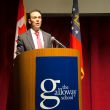
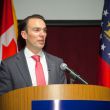
 Click on one of the images to view the gallery (13 images).
Click on one of the images to view the gallery (13 images).28 November 2013
In November, Holocaust Education Week takes place in my home city of Toronto. I was pleased to participate in an event at Ryerson University, organized by the Sarah and Chaim Neuberger Holocaust Education Centre, titled The Holocaust Legacies: The Canadian Connection. The panel included Irving Abella and Harold Troper, co-authors of None Is Too Many, which is a treatise on Canada’s infamous policies towards Jewish refugees fleeing Europe. This year marks 30 years after its publication.
Next, I left for Uruguay, only a month after the country joined IHRA as an Observer. I met with key officials, including the Minister of Foreign Affairs, the Minister of Education and Culture, the President of the Chamber of Deputies, as well as other government representatives and ambassadors from IHRA member countries. I also delivered speeches at the Parliamentary Committee on Human Rights and at ORT University, met with students at a Jewish school, as well as Holocaust survivors at the Museum of the Shoa. I was honoured to be recognized as a "Distinguished Visitor” of Montevideo’s City Hall by the Mayor.
One key proposal made by the Jewish community is to integrate Holocaust learning/teaching within the famous Ceibal Plan (one laptop for each student), which is currently a successful pilot project in Uruguay. For his part, the President of the Chamber of Deputies even said that he is committed to creating an inter-party dialogue on this topic.
Brazil was next on my agenda and, during my visit to Brasilia, I had the opportunity to meet Minister Alexandre Pena Ghisleni, who has responsibilities for human rights, and Minister Luiz Fux of the Supreme Court of Brazil. I also met with Deputy Gabriel Chalita, who chaired the Parliamentary Education Committee and is a former State Secretary of Education. Brazil has a very active and vibrant Jewish community. President Dilma Rousseff attends annual International Holocaust Remembrance Day events and, recently, Brazil also opened a Holocaust Museum in Curitiba. I had several important meetings with members of the Association Brasileira Israelita, diplomatic representatives of other IHRA member countries, as well as a series of roundtable discussions with academics from local universities, which have tremendously raised the profile and network of the International Holocaust Remembrance Alliance in Brazil and the leadership of Canada during our Chairmanship year.
While in Sao Paulo, I met with prominent community leaders, including Dr. Claudio Lottenberg, Marcia Feldon, Abraham Goldstein and Professor Maria Luiza Carneiro, who were extremely helpful in supporting Brazil's future candidacy as an IHRA Observer. I was also grateful for the opportunity to meet with so many survivors at B'nai Brith and for the exchange of views with human rights leaders and students.
My next visit was to Argentina and Paraguay. I appreciated the significance of meeting Argentina's IHRA working group at the ESMA detention and extermination camp, and meeting grandmothers who searched for their missing grandchildren. I was especially moved that one of the grandmothers was a Holocaust survivor, who lost family members in both the Holocaust and during the dictatorship in Argentina. The meeting with the Secretary of Foreign Relations, Eduardo Zuain, was a very useful occasion to outline IHRA's direction and to solicit their support. The several events that I attended at both the AMIA and at the Holocaust Museum were a useful reminder of the importance of state and individual vigilance to combat all forms of hate. I also appreciated meeting several members of civil society for a very lively discussion regarding human rights. Finally, the visit to Paraguay was appreciated by both government and members of the Jewish community. The meetings with members of the Human Rights Commission, including with senators, was very productive.
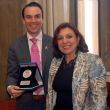
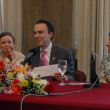
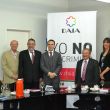 Click on one of the images to view the gallery (8 images).
Click on one of the images to view the gallery (8 images).4 November 2013
Turkey is one of five IHRA Observer Countries and one of our most active. Although I have been to Turkey before in another capacity, this was my first visit to Ankara and I was accompanied by our Executive Secretary, Dr. Kathrin Meyer. I appreciated the high level program that was arranged by Turkey’s Head of Delegation to IHRA, Ambassador Ertan Tezgor. The program included meetings with the Ministry of Foreign Affairs, the President of the Education Council, the Minister of Education, and several members of Turkey’s expert IHRA delegation.
Following our visit to Ankara, Dr. Meyer and I travelled to Istanbul to attend an International Seminar on Holocaust Education, where I delivered the opening remarks. The seminar was held at the Galatasaray University and was organized by the Aladdin Project with support from IHRA and the United States Holocaust Memorial Museum. The seminar had excellent speakers and I congratulate the Aladdin Project for their work.
While in Istanbul I also spoke at the Holocaust Studies Program for Turkish Academics organized by Yad Vashem and the Aladdin Project with the support of IHRA. I look forward to seeing further results from the next stages of this project.
During our meetings, Ambassador Tezgor indicated Turkey’s interest in moving forward in the membership process and I indicated that Canada welcomes this initiative. Full membership for Turkey will only strengthen IHRA’s work on Holocaust remembrance, research and education.
Following the seminar, I was off to Portugal. Several high-level meetings were arranged for me, including with two Secretaries of State, Jose Cesario and Berta Cabral, as well as with the Deputy Speaker, Mota Amaral. I also met with the Portuguese Head of Delegation to the IHRA, Ambassador Carlos Pais and with Ambassador Rui Macieira, Political Director General at the Ministry of Foreign Affairs.
These meetings provided an excellent opportunity to strengthen the relationship of IHRA with Portugal and hopefully help the government to advance toward full membership. While in Lisbon, I also participated at a signing ceremony for a Protocol between le Mémorial de la Shoah and the Gulbenkian Foundation on Holocaust education, investigation, and memorialization. The event included an education seminar with an excellent panel and I was honoured to give the closing remarks at such an important undertaking.
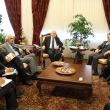
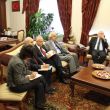
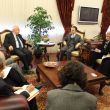 Click on one of the images to view the gallery (8 images).
Click on one of the images to view the gallery (8 images).24 October 2013
Thanks to IHRA delegates for a successful plenary in Toronto, including the following key decisions to:
For more information on the IHRA meetings and events held October 6-10, 2013, please visit the following link: http://www.holocaustremembrance.com/media-room/stories/toronto-plenary-0
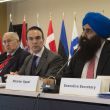
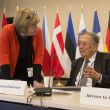
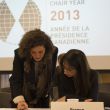 Click on one of the images to view the gallery (9 images).
Click on one of the images to view the gallery (9 images).1 October 2013
I started my European journey in London and had a good opportunity to discuss IHRA’s upcoming agenda and priorities with the incoming UK Chair, Sir Andrew Burns. Following my visit to the UK, I went to Geneva and later held meetings at the Permanent Office in Berlin.
Shortly afterwards I was in Tallinn and had an opportunity to meet with the Minister of Culture for Estonia, Estonia’s Head of Delegation to IHRA, Ambassador Malle Talvet-Mustonen, and members of the Estonian delegation. I also took part in a panel discussion along with the US Head of Delegation, Douglas Davidson, on “Lessons of the Holocaust: from Klooga and around the World” organized by the Estonian Foreign Policy Institute. Estonia should be congratulated for opening a new outdoor exhibition at the Klooga Holocaust Memorial Site.
Next I went to Belgrade and met with members of the Serbian delegation to IHRA organized by the Serbia Head of Delegation, Ambassador Sladjana Prica, at the Serbian Ministry of Foreign Affairs. While in Belgrade I also had the opportunity to meet with members of the Jewish community.
From 20-22 September, I participated in the IV World Litvak Congress, which brought together many Holocaust survivors and their descendants to Lithuania. During this occasion I had the chance to meet with the Lithuanian Head of Delegation, Neris Germanas, and the Minister of Foreign Affairs. This is a busy time for the Lithuanian government given that they hold the EU Presidency.
My next journey was to Ljubljana to meet with Slovenian Head of Delegation Eva Tomic and the Slovenian IHRA delegation. I also had a good meeting with Ambassador Dragoljuba Bencina, Director General for Global Issues and Multilateral Political Relations at the Ministry of Foreign Affairs.
I then traveled to Bratislava for a meeting with the Slovakian Head of Delegation, Ambassador Peter Holasek, who also arranged a meeting with the Minister of Education. We also met with the Jewish Museum and the Slovakian delegation.
The following day, I went to Bucharest and held several high-level meetings with the Minister of Education and the Minister of Culture as well as the State Secretary for Foreign Affairs. Prof. Dr. Michael Shafir and Felicia Waldman, Romania’s Head and Deputy Head of Delegation, provided me with the opportunity to see parts of the Jewish Bucharest (Unirii area). I also visited several institutions, including participating in a class that teaches the Holocaust at Benjamin Franklin High School and visiting the Elie Wiesel National Institute.
I next went to Kiev to participate in the ceremony for the commemoration of Babi Yar. The event was organized by local NGOs. It is always emotional when attending a ceremony with survivors and eyewitnesses at a site with such a terrible history.
Tomorrow I will be a keynote speaker at the conference “Jewish Life and Antisemitism in Budapest” organized by the Tom Lantos Institute. I will end my journey in Copenhagen, where the Queen and Prime Minister will attend a ceremony at the Royal Theatre Ceremony for the “1943 Conference: Reaction to Holocaust.”
I am very much looking forward to returning home and welcoming IHRA delegates to the Toronto Plenary from 6-10 October.
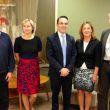
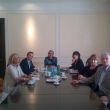
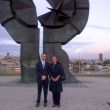 Click on one of the images to view the gallery (28 images).
Click on one of the images to view the gallery (28 images).5 July 2013
I have just returned from the first Canadian Plenary in Berlin where we approved a multi-year project that will identify effective approaches to teaching and learning about the Holocaust. In addition, in line with Canada’s goal of raising awareness of IHRA and increasing membership, a number of special guests attended, including from Ukraine, Albania, Australia and South Africa.
Following the Plenary, I had an opportunity to meet with our Permanent Observers for discussions on how to better work together. I’m grateful for all wonderful suggestions and I look forward to our further cooperation as partners in combating Holocaust denial and antisemitism.
A few days later I was off to speak at the Annual General Meeting of the Vancouver Holocaust Education Centre and was honoured to speak with the two amazing teachers, Kayla Dominelli and Gerry Chidiac, recipients of the 2013 Kron Sigal Award. Their strong commitment to teaching students about the Holocaust and its important lessons for humankind is truly remarkable.
By the end of the week I was travelling to Ukraine to attend the inaugural dinner of the Metropolitan Andrey Sheptytsky Medal awarded to Jim Tamerty for his work in fostering Ukrainian-Jewish relations. Mr. Tamerty was appointed by Minister Jason Kenney to the Canadian Advisory Council for the 2013 IHRA presidency. The Canadian Parliament honoured Metropolitan Sheptytsky in 2012 for his courageous actions during World War II – he was responsible for saving over 160 Jews – as an example of enduring commitment to fundamental human rights. I also met with Ukraine’s Minister of Culture, Dr. Leonid Novokhatko, regarding further cooperation between IHRA and Ukraine.
I returned to Canada via Paris, which gave me an opportunity to visit Mémorial de la Shoah and meet with officials at the Fondation pour la Mémoire de la Shoah, Father Patrick Debois, and France’s Head of Delegation, Ambassador Francois Zimeray. To further enhance our relationship with our Permanent Observers, I met with the Director General of UNESCO, Irina Bokova. We had a good discussion relating to the current program they have on the Holocaust and how to reach out to non-IHRA states.
Upon my return to Canada I was the keynote speaker at a Canadian Society for Yad Vashem education conference in Toronto, “Then and Now,” which aims to enhance and strengthen the quality of Holocaust education across Canada.
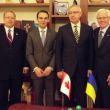
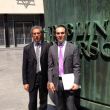
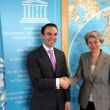 Click on one of the images to view the gallery (3 images).
Click on one of the images to view the gallery (3 images).
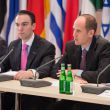
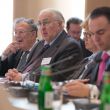
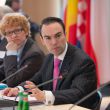 Click on one of the images to view the gallery (27 images).
Click on one of the images to view the gallery (27 images).5 June 2013
I have had a busy month of May, undertaking several country visits for preparation meetings in advance of our Plenary, which is taking place only days away in Berlin.
My first meeting when I landed in Berlin on May 15 was at the Foreign Office with Victoria Zimmermann von Siefart (German Head of Delegation to IHRA) and Dr. Kathrin Meyer to discuss relevant issues for the upcoming IHRA Plenary. It was a very productive meeting, but the next day Kathrin and I were off to Latvia.
Our first visit was to the Jānis Lipke Museum in Riga. Lipke smuggled and hid Jews and was honoured as one of the Righteous Among the Nations. We also visited the memorial site of the Rumbula massacre, where about 25,000 Jews were killed. We met with the Ministry of Education and the Head of Delegation at the Ministry of Foreign Affairs to discuss upcoming Plenary issues.
I then travelled to Vilnius, where I had meetings with the Lithuanian Head of Delegation to the IHRA, Neris Germanis, the Executive of the Lithuanian Jewish community, key officials in the Prime Minister;s Office, and academics working on Holocaust issues in Lithuania. Lithuania, like other Baltic states, had their own distinct and highly developed Jewish culture, with a population of some 160,000 and by the time Soviet troops reoccupied Lithuania in the summer of 1944, 90 percent of Lithuanian Jews, one of the highest victim rates in Europe, were murdered.
I am thankful for all the assistance that our Canadian Ambassador John Morrison and our Charge d’Affaires in Lithuania Kevin Hamilton provided during my visits to Latvia and Lithuania.
The next day I was off to Tirana to attend a High Level meeting of OSCE on the topic of antisemitism, where I delivered a speech on the strengthening Holocaust remembrance efforts as an important means of combating antisemitism. I had an opportunity to have a bilateral meeting with the Albanian Minister of Foreign Affairs, who indicated Albania’s interest in joining IHRA as an observer. I also spoke with Ambassador Ihor Prokopchuk from Ukraine, who is presently the Chair of the OSCE, regarding the importance of an eventual Ukrainian membership in IHRA.
My next meeting was in Zagreb, where I spoke at an international conference on the Historical Experience of Roma in Europe with the Promotion of Tolerance and Non-Discrimination of Roma, held as part of the Presidency of the Republic of Croatia of the Decade of Roma Inclusion 2005-2015. I delivered a speech on IHRA’s efforts to raise awareness of the Roma/Sinti genocide. I am thankful to Canada’s Ambassador to Croatia, Louise LaRocque, for all her assistance.
In Greece, I met with the Greek Head of Delegation to IHRA, Photini Constantopoulou, along with many members of the Greek Jewish community. I also met with the Minister of Justice to discuss the proposed bill that would outlaw public incitement against people because of their race, religion, ethnicity or sexual orientation, and impose jail sentences of up to six years on offenders. I am grateful for all the assistance of Canadian Ambassador Robert Peck and his team in Athens.
My final country visit before returning to Canada was to Israel to speak at the Global Forum for Combating Antisemitism in Jerusalem. At the Global Forum, I conveyed IHRA’s commitment to combat the different manifestations of the current antisemitism. With the support of Canadian Ambassador Paul Hunt, we had very constructive meetings arranged with several key organizations, including Yad Vashem. In addition, several IHRA HoDs were in attendance, including Estonia, the UK and Serbia, which provided Kathrin Meyer and I with an opportunity to discuss issues related to the Berlin Plenary.
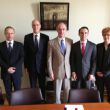
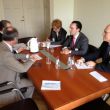
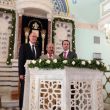 Click on one of the images to view the gallery (35 images).
Click on one of the images to view the gallery (35 images).8 May 2013
Shortly after my visit to Hungary and Poland, I returned to Canada and spoke at the Yom HaShoah event on Parliament Hill and at the Canadian War Museum. Since the establishment of a National Holocaust Remembrance Day by the Parliament of Canada in 2003, the Government of Canada signaled once more its longstanding commitment to ensuring that the lessons of the Holocaust are enshrined in the hearts and minds of Canadians. The Government of Canada also announced the site of Canada’s new National Holocaust Monument in Ottawa.
The event is lead by the Canadian Society for Yad Vashem, with hundreds of dignitaries, Parliamentarians and community members in attendance. I had the honour, along with Senator Linda Frum, Minister Rona Ambrose and Ambassador of Israel Miriam Ziv to light one of the Yad Vashem Menorah, with its six-branched candelabra representing the six million Jews who perished. Minister Jason Kenney, Member of Parliament Mark Adler and Canadian Society for Yad Vashem Chair, Fran Sonshine presented a certificate to 60 survivors that were in attendance. Many of the survivors I spoke with were delighted to be invited to the Parliament of Canada and to receive a certificate on behalf of the Government. Upwards of 30,000 Holocaust survivors settled in Canada in the years immediately following the war.
I also participated in the “If Not Now When? Holocaust Responsibility and Memory” conference at Carleton University in Ottawa. Over 200 participants, including Canadian parliamentarians, senior Holocaust scholars and survivors, attended the conference, which was held in recognition of Canada’s assumption of the Chair of the International Holocaust Remembrance Alliance. The conference goal was to generate further public discourse on the importance of Holocaust education and the preservation of Holocaust memory. I noted in my speech that “Because the Holocaust was a failure of humanity, remembering it is our duty, our obligation, to the future.” Holocaust survivors were present to strengthen the memory of the Holocaust with unsettling and horrific accounts of their experiences in concentration camps.
On the April 28 and 29, the United States Holocaust Memorial Museum marked two decades of honouring Holocaust memory with a tribute dinner to Holocaust Survivors and World War II Veterans. Over 840 survivors and 110 World War II veterans joined thousands of international guests, dignitaries and Museum partners to mark the milestone and challenge new generations to continue the Museum’s important work. President Bill Clinton gave the keynote address at the opening Tribute Ceremony along with the Museum Founding Chairman Elie Wiesel. The museum presented its highest honour to World War II veterans who ended the Holocaust. Susan Eisenhower accepted the award on behalf of her grandfather, U.S. Gen. Dwight D. Eisenhower, and all veterans of the era.
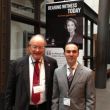
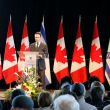
 Click on one of the images to view the gallery (6 images).
Click on one of the images to view the gallery (6 images).30 April 2013
During the week of 15 April I made two special country visits to Hungary and Poland. These trips were special in the sense that they combined a Chair’s visit with the programs of the Multi-Year Work Plan’s Holocaust Memorial Days Steering Committee. In this capacity I was accompanied by Advisor to the IHRA Steven Katz as well as the Executive Secretary.
In Hungary we had a very full and productive program over the three days of our visit. We began with a meeting with the President of MAZSIHISZ (Alliance of Hungarian Jewish Faith Communes), Mr. Péter Feldmájer, and the CEO of MAZSIHISZ, Mr. Gusztáv Zoltai, followed by a meeting with the Hungarian Head and Deputy Head of Delegation, Mr. Gergely Prőhle and Ms. Komáromy.
On 16 April, Hungary marks the National Memorial Day of the Hungarian Victims of the Holocaust. This date is the anniversary of the establishment of the first ghetto on Hungarian territory in Munkács in 1944. The Memorial Day was established by a political declaration of Parliament and was first commemorated in 2000. We traveled to Hódmezővásárhely, where we were welcomed by the vice-Mayor. The first ceremony we attended in Hódmezővásárhely was opened by Minister of Defense Mr. Czaba Hende, and commemorative wreaths were laid on behalf of the government, the municipality, the IHRA, and the local school. Professor Katz then gave a speech to the students.
I was also interviewed by a national TV station and the Hungarian news agency MTI issued a detailed article on the speeches in Hódmezővásárhely. The press coverage of the National Memorial Day and our visit was impressive and far-reaching – two large newspapers published articles about the Hódmezővásárhely speeches in their editions, and the commemoration event at the Holocaust Documentation Center, which included Professor Katz’s speech, was broadcast live on Duna Televízió. The government of Hungary also established a special website for the National Memorial Day, which is also available in English.
The second official ceremony in Hódmezővásárhely included an address by vice-Mayor Mr. Peter Kószó and a lunch hosted by the city afterwards. I was honored to have the opportunity to deliver the keynote speech at this ceremony.
Back in Budapest we attended the evening ceremony at the Holocaust Memorial Centre, during which extracts from student essays on the topic “Losses of Hungarian Culture” were read. A temporary exhibition entitled “Memories-Images: Unforgettable Life Stories from the 20th Century” was opened by Monika Balatoni, Minister of State for Public Diplomacy and Relations at the Ministry of Public Administration and Justice. The 2013 Wiesenthal Awards were also presented alongside performances by the Budapest Klezmer Band. Professor Katz gave the memorial speech at the evening event and participants paid tribute to the memory of the victims by lighting candles at placing stones of remembrance. Following the event, a commemorative ceremony was held at the “Shoes on the Danube” memorial site to the victims of the Holocaust.
On our final day in Budapest, we had a number of high-level political meetings to discuss IHRA business. We first met with Under-Secretary of State Mr. Péter Mikecz and Chief Advisor for Holocaust Remembrance Issues Mr. Zsigmond Perényi at the Prime Minister’s office. There we were briefed on the plans for the Hungarian Holocaust 2014 Memorial Committee, and I was pleased to learn that events will be taking place throughout the entire year of 2014 to commemorate the 70th anniversary of the deportations of Hungarian Jews in 1944. We made a visit to the Parliament before meeting with Mr. József Kaposi, Director General of the Institute for Educational Research and Development (OFI). Our last meetings were held at the Ministry of Foreign Affairs with Deputy Head of Delegation Ms. Andrea Komáromy and Secretary of State Mr. Zsolt Németh.
The trip to Hungary offered a wide range of meetings and the opportunity to speak with a variety of people at both the practical and political levels. I was personally very moved by all of the impressive events that we attended and am glad to have had the opportunity to be in Hungary on a meaningful occasion such as the National Memorial Day of the Hungarian Victims of the Holocaust.
Following our visit to Hungary we flew to Warsaw, where we attended a commemorative ceremony at the Monument of the Evacuation of Warsaw Ghetto Fighters. Many dignitaries from the diplomatic corps were present, and Symcha Rotem, organizer of the evacuation, was also in attendance as a special guest.
After the ceremony we met with Deputy Foreign Minister Jerzy Pomianowski as well as the Head and Deputy Head of Delegation of Poland, Mr. Olendzki and Mr. Rejak. Professor Katz delivered a lecture on the Jewish resistance movement during the Holocaust at the Jewish Historical Institute. The events on 18 April concluded with a solemn concert by the Israeli Philharmonic Orchestra commemorating the 70th anniversary of the Warsaw Ghetto uprising.
On 19 April, the date of the Warsaw Ghetto uprising, the main commemoration event was held near the Warsaw Ghetto Heroes Monument. Speeches were given by Mayor of Warsaw Hanna Gronkiewicz-Waltz and President of the Republic of Poland Bronislaw Komorowski. I also had the chance to view the inside of the building of the new Museum of the History of Polish Jews.
While in Warsaw I took the opportunity to meet with Ambassador Janez Lenarčič, Director of the Office for Democratic Institutions and Human Rights (OSCE/ODIHR). We discussed concrete collaboration on assisting OSCE-participating States that are not IHRA member countries to establish a common effort for Holocaust Memorial Days.
15 April 2013
I was pleased to have the opportunity to meet the new Polish Head of Delegation to IHRA, Ambassador Krzystof Olendzki, and Deputy Head of Delegation Sebastian Rejak during their visit to Canada on March 22nd. Poland joined the IHRA in 1999 and has also held the Chairmanship in 2005.
Canada’s Head of Delegation, Colin Boyd, and I went to Washington in early April and met with Paul Shapiro at the US Holocaust Memorial Museum and later in the day we met at the State Department with US Head of Delegation Douglas Davidson, Deputy Head of Delegation Liz Nakian, and Susan Sandler. The meeting afforded us an opportunity to discuss various issues regarding the IHRA.
Canada commemorates Yom Hashoah (Holocaust Remembrance Day) with several ceremonies of observance across the country. The ceremony was inaugurated in 1953 by the Prime Minister of Israel David Ben-Gurion and the President Yitzhak Ben-Zvi and today is observed by several countries. For 2013, Yom Hashoah began at sundown on Sunday, April 7.
On April 7, I participated in the Yom Hashoah V’Hagvurah Community Holocaust Commemoration at the Joseph & Wolf Lebovic Jewish Community Campus (Schwartz/Reisman Centre in Vaughan). The ceremony was co-sponsored by the Canadian Society for Yad Vashem and Sarah and Chaim Neuberger Holocaust Education Centre, UJA Federation of Greater Toronto. Participating organizations included B’nai Brith Canada, the Centre for Israel and Jewish Affairs, the Consulate General of Israel, General Wingate Branch 256 of the Royal Canadian Legion, Hillel of Greater Toronto, Canadian Jewish Holocaust survivors and descendants, Jewish War Veterans of Canada, the Toronto Board of Rabbis, the Toronto Council of Hazzanim, and Vaad Ha’Rabbanim.
Approximately 1,500 people gathered for a solemn and moving ceremony that involved the participation of Holocaust survivors, students, Jewish war veterans, politicians and community members alike. I was honoured to attend.
Later that day I flew to Montreal and spoke at the Yom Hashoah commemoration at the Congregation Tifereth Beth David Jerusalem. The ceremony was organized by the Montreal Holocaust Memorial Centre with the theme of commemorating the 70th anniversary of the uprisings of 1943 in Warsaw, Vilna, and other ghettos.
The following day it was back to Toronto where I attended the annual League for Human Rights of B'nai Brith Canada joint event with the Law Society of Upper Canada. This year's topic was "The Road from Democracy to Dictatorship, from the Holocaust to the Present Day." The event was very well attended with great panelists, who reminded us that the freedoms of democracy can still be exploited. I was honoured by Frank Dimant, CEO of B'nai Brith Canada, with a certificate recognizing my efforts to promote Holocaust education and awareness.
The Canadian Society for Yad Vashem, which holds an annual event at Ottawa’s War Museum, will hold their ceremony on April 23rd due to the fact the Canadian Parliament was not in session during the week of April 7.
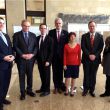

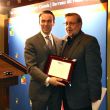 Click on one of the images to view the gallery (4 images).
Click on one of the images to view the gallery (4 images).21 March 2013
I was honoured to become the Chair of IHRA at a handover ceremony held at the Canadian Embassy in Berlin on March 5, 2013. We were privileged to have with us representatives from IHRA member countries and special guests from Germany and Canada, including Canada’s Minister of Citizenship, Immigration and Multiculturalism, Jason Kenney.
Following the IHRA handover, a separate special art restitution ceremony took place at the Canadian Embassy. The ceremony marked the return of a painting from a German museum to the Max Stern Art Restitution Project, which is led by Concordia University in Montreal, Canada, acting on behalf of the executors of the Estate of Max Stern and its three university beneficiaries (Concordia and McGill Universities in Montreal and Hebrew University in Jerusalem).
I arrived in Berlin via Kiev, where I attended several high-level meetings with Minister Kenney, who was extremely helpful in promoting IHRA in the Ukraine. During the Canadian Chair year, I will encourage Ukraine to attend IHRA meetings or events as a special guest and to join IHRA as an observer country. I would also like to note the deep impact I felt during my visit to Ukraine with Minister Kenney to several memorial sites, including Babi Yar and the Holdomor.
Shortly following the handover, I conducted my first country visits to meet with Heads of Delegation and Working Group experts. The purpose of these meetings was to obtain further insight into the views of delegations on various issues on the IHRA’s agenda, including the multi-year work plan, Working Groups, and country reporting mechanism.
I first travelled to Vienna along with Klara Steele, Canada’s Deputy Head of Delegation. We met with members of the Austrian delegation to IHRA, Gregor Schusterschitz, Hannah Lessing and Dr. Heidemarie Uhl. In addition to the general agenda items, the meeting also provided me with the opportunity to discuss relevant questions regarding the work of the Legal Drafting Group, which has been so ably led by Gregor Schusterschitz over the past years.
The following day, Klara and I went to Prague and had a wonderful opportunity to meet with Austrian Ambassador Ferdinand Trauttmansdorff, who chaired the ITF/IHRA in 2008. The insights and assistance provided by Ambassador Trauttmansdorff were greatly appreciated. We also met with members of the Czech Ministry of Foreign Affairs, including the Head of Delegation, Dr. Veronika Bajgarova, who is the Director of Human Rights and Transition Policy at the Ministry of Foreign Affairs, and her colleagues Mr. Jiří Kalašnikov and Mr. Jiří Čistecký. We had a useful discussion on current IHRA issues and discussed the work of the European Shoah Legacy Institute.
On March 8, I spoke at an event at the UN in Geneva on the topic of “Prevention of Mass Atrocities – Regional Perspectives,” sponsored by the Government of Hungary and co-sponsored by the Canadian and Ethiopian Missions, where I stressed the importance of education, research and remembrance of the Holocaust for preventing other atrocities.
Back in Berlin on March 11, upon invitation of the Permanent Office, I met with several members of the German delegation, Dr. Wolf Kaiser, Dr. Juliane Wetzel and Dr. Thomas Lutz, where we had a very useful discussion on Working Groups and the multi-year work plan. I am also grateful to Dr. Wolf Kaiser, Director of the Educational Department of the House of the Wannsee Conference in Berlin, who took the time to tour and explain the historical details of the site.
I then had the opportunity to travel to Bern and Stockholm on March 12 and 14 with Dr. Kathrin Meyer. In Bern, I met with the new Swiss Head of Delegation, Ambassador Benno Bättig, Secretary General of the Federal Department of Foreign Affairs. Together with two of his colleagues from the Swiss delegation, I discussed the current IHRA agenda.
While in Stockholm, the Head of Delegation, Dr. Eskil Franck, invited us to a meeting with some of his colleagues and members of the Swedish delegation to the Living History Forum. We were also received at the Ministry for Foreign Affairs for consultations with Mr. Per Sjögren, Dr. Per Bergling, and Ms. Teresia Ståhle. I also met with Ambassador Hans Olsson of the Department for Eastern Europe and Central Asia, who is responsible for the Raoul Wallenberg Case. Mr. Wallenberg became Canada’s first honorary citizen in 1985, and earlier this year Canada Post issued a commemorative stamp to recognize his exceptional courage.
Together, these meetings were very helpful and I look forward to many more country visits throughout the Chair year.
One of my key organizational objectives for the Chair year is to raise the profile and good work of IHRA internationally through enhanced external communications. From the Chairmanship page on IHRA’s new website, you are able to access my Twitter account and find this Chair’s blog for regular updates on activities I will undertake on behalf of IHRA.
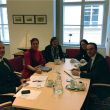
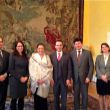
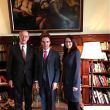 Click on one of the images to view the gallery (13 images).
Click on one of the images to view the gallery (13 images).